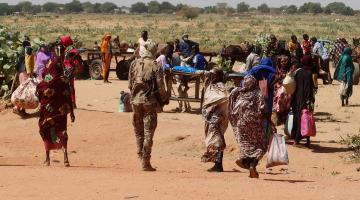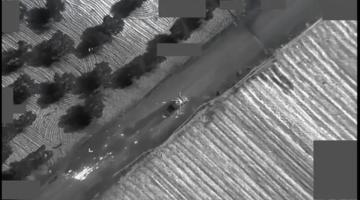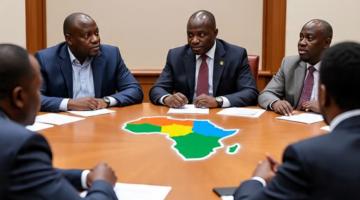Conservation in Africa has long been a smokescreen for imperial power. Veiled behind the cause of environmentalism and stopping poachers, western governments, intelligence agencies, and billionaire-funded NGOs expand their reach by deploying drones, private armies, and surveillance tech.
The bombastic and unfounded claims of “white genocide” by Donald Trump overshadowed other important discussion points raised during his meeting with South African President Cyril Ramaphosa in May 2025. During the news conference that amounted to a theatrical performance, white South African business mogul, JP Rupert, intervened to assuage the tension caused by Trump’s ambush. In doing so, he did not miss the opportunity to present himself as a savior of African wildlife whose noble quest to save species was obstructed by the ostensible incompetence of an African president. Rupert remarked:
“I actually got drones donated for the Peace Parks to stop elephant and lion poaching and his [President Ramaphosa] predecessor stopped the importation because he said the United States would spy on us...basically US spying, how ridiculous.”
Rupert’s statement about former South African president Jacob Zuma, resisting drone importation for anti-poaching efforts out of security concerns, should alert us to the insidiousness of Western and capitalist-led wildlife conservation strategies in Africa. Not least because the transboundary nature of protecting wildlife roaming across vast expanses of land that cover multiple countries provides an opportunity for state and non-state actors to expand their influence under little public scrutiny.
For many in the conservation field and critical of it, Rupert’s comment resonated for several reasons. On the surface, the chauvinist tone of the white settler capitalist reflected the deep-seated racist idea in mainstream conservation that Africans are incapable of protecting wildlife. Furthermore, it wasn’t lost on some of us that Rupert, the director of a powerful conservation NGO called Peace Parks Foundation, had used the White House news conference to convey the idea of using military and surveillance technology for wildlife conservation in Africa. It is common for U.S. and British conservationists to lobby their governments for military aid despite the well-documented violence of militarized conservation in the Global South. But most importantly, Zuma’s concerns that the importation of drones to fight poaching would be an overreach of the U.S. government into the security apparatus of South Africa, which Rupert attempted to discredit, were well-founded. The then president of South Africa was likely informed about wildlife conservation’s record of being integrated with gathering intelligence for states and imperialist interests, including in his own country.
In 1987, the British military led Operation Lock, a project of the World Wildlife Fund (WWF), whose founding president was Prince Bernhard of the Netherlands, which was primarily aimed at fighting rhino poaching in Southern African countries. The operation was carried out by a security firm, KAS, led by Sir David Stirling, founder of the British Special Air Services (SAS). It was headquartered in Johannesburg, South Africa, but extended its reach by infiltrating wildlife trade networks in neighboring states, including Namibia, Zambia, Botswana and Mozambique. During the deployment of Operation Lock, Southern African government officials expressed major concerns that the anti-poaching agents were gathering wider intelligence to assist the apartheid regime in destabilizing the Front-Line states. Internal documents reveal that the head of operations, Tim Crooke, a former SAS officer, collaborated with South Africa’s superspy, Craig Williamson, who was running a covert operation against the African National Congress (ANC) for the apartheid regime. In 2015, the accusations were corroborated by John Hanks, the former director of Africa Programs for WWF-International, in his book Operation Lock and the War on Rhino Poaching. Operation Lock is just one of several examples that predate current interest in intelligence-led approaches to tackle the illegal wildlife trade. Researchers have called attention to the rapid and alarming convergence of wildlife conservation and the Western global security apparatus.
Wildlife conservation and intelligence gathering for imperialism
In her book, Security and Conservation: The Politics of the Illegal Wildlife Trade, Rosaleen Duffy, one of the most prominent researchers in militarized conservation, critically reflects on this convergence, drawing from Western-led operations to combat wildlife trafficking over the past 40 years. She examines the resurgence of transnational anti-poaching initiatives in recent years in the context of the US and NATO-led war on terrorism.
In the early 2010s, claims surfaced that poaching was a source of funding for terrorist organizations, most notably Boko Haram, Al-Qaeda and Lord’s Resistance Army. Those claims were challenged by researchers working on illegal wildlife trade networks, explaining that the link between poaching and terrorism was overblown. In 2017, a study by Tim Wittig reported that poaching and wildlife trafficking remained about fundamentally technical issues for national authorities rather than about issues of significance for international security. Despite our rudimentary understanding of how poaching is connected to terrorism, conservation NGOs have used this argument to gain the attention of the U.S State Department and the Department of Defense.
In November 2012, then-Secretary of State Hillary Clinton gave a speech highly praised by Western conservation NGOs, in which she elevated the illegal wildlife trade to an issue of national security. Francis Massé and Jared Margulies’s study on the geopolitical ecology of conservation elucidates how these claims have reshaped U.S. foreign assistance to biodiversity conservation. Between 2002 and the end of fiscal year 2018, the US Fisheries and Wildlife Services Division of International Affairs provided assistance to 4142 projects across 106 countries worth over $301 million. Africa received around 60 percent of that assistance. Starting in 2014, an increasing portion has been allocated annually ($ 45 million in 2014 to $91 million in 2017) specifically to intelligence-led operations and transnational law enforcement coordination aimed at tackling wildlife trafficking at the expense of other conservation priorities, such as improving livelihoods and ecological monitoring and restoration. Similar patterns can be observed for U.K. foreign conservation assistance.
Gathering and sharing data on wildlife trafficking, the geographical patterns of the trade, the individuals and groups involved, the transport routes, and entry and exit ports are central to Western intelligence-led approaches. Conservation NGOs, including WWF, International Fund for Animal Welfare (IFAW), Wildlife Conservation Society, Zoological Society of London, continue to hire advisors trained in military or police intelligence, or partner with private intelligence companies staffed by former operatives from intelligence services such as Bureau of State Security in apartheid South Africa and MOSSAD intelligence agency of Israel.
In a moment of cataclysmic shifts in geopolitical dynamics when imperial powers spare no effort to maintain their hegemony, we would be mistaken to downplay the use of intelligence gathered in wildlife conservation by Western governments. It would be equally naïve to take JP Rupert’s eagerness to donate drones to Peace Parks for the protection of elephants and lions at face value. From the pedigree of a capitalist class, Rupert represents the generation that embeds themselves in the environmental movement to obscure new forms of capitalist accumulation.
Wildlife conservation and capitalist accumulation
JP Rupert chairs the board of directors of Peace Parks Foundation, a conservation agency managing Transboundary Conservation Areas (TCA) throughout Southern African countries. Founded by Prince Bernhard and the South African business mogul, Aaron Rupert, father of JP Rupert, Peace Parks manages a staggering 75.7 million hectares of land, all spanning across 11 Southern African countries. Another major player in the management of TCAs is African Parks, founded by Dutch Billionaire, Paul Fentener van Vlissingen and managed by a group of venture capitalists, acquired management rights over 20 million hectares of land across Southern, Central and West Africa.
Their strategy is presented as “a clear business approach to conserving Africa’s wildlife and remaining wild areas, securing vast landscapes and carrying out the necessary activities needed to protect the parks and their wildlife”. Both organizations have drawn sharp criticism over their fervent push to further militarize conservation areas, contracting with US and Israeli security and military technology companies to train rangers and secure weapons and surveillance technologies to protect its parks.
The convergence of wildlife conservation and the global military-industrial complex is supported by a capitalist class all too eager to protect wildlife as its prized property, while opening new markets to US, British and Israeli military technology companies. Wildlife has been an instrument to expand, deepen and militarize the control of land and resources by foreign capital. Peace Parks Foundation and African Parks are not the only actors in this arena. In fact, the ascendancy of finance capital and its near total capture of the African conservation sector is glaring solely by examining the highest seat of leadership in the largest conservation NGOs active in Africa, namely WWF, Conservation International and Wildlife Conservation Society.
There is legitimate cause for concern about the declining wildlife population. But saving elephants and other animals, under the aegis of Western states and capital, has been a veneer for entrenched imperialism in Africa. The western model of wildlife conservation has always been a structural force in imperialism. Since the dawn of European colonization of the world's peripheries and settler colonies, the enclosures of wildlife habitats as a ‘conservation’ practice have galvanized the massive dispossession of Indigenous peoples. Today, the militarization and privatization of wildlife enclosures covering different countries is a continuation of the colonial history of conservation.
Imperialist institutions impose technocratic and oppressive conservation strategies while biodiversity loss continues unabated. According to the Intergovernmental Science-Policy Platform on Biodiversity and Ecosystem Services, the primary driver of decline in wildlife populations is habitat loss due to agricultural development. In Africa, particularly, natural habitats are being transformed for commercial farming to produce commodities (i.e., biofuels and grains) for export to the global North. Therefore, saving elephants and lions in Africa requires a fundamental challenge to the global capitalist system.
Aby L. Sène is associate professor of Conservation & Development at Clemson University.



















